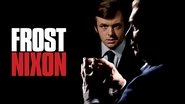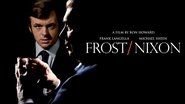gbkmmaurstad
President Richard Nixon (Frank Langlla) resigned the office of the President of the United States in 1974 following the Watergate investigation. After more that two years of self-imposed seclusion at his home, La Casa Pacifica in San Clemente, California, his literary agent Swifty Lazer (Toby Jones) suggests Nixon redeem his reputation by granting a television interview. They select David Frost (Michael Sheen), a jet- setter, playboy who has had television talk shows in Australian and New York, but his career is stalling.Nixon needs the money and Frost needs the credibility, both men need these interviews to be "their" success. What follows is a dramatization of the Nixon/Frost interviews held at San Clemente and touted as one of the most watched television interviews of all time.
D' Francis
Frost/Nixon was captivating the whole way through. It was a competition between two men, a political outsider and insider both looking to use the media to advance their careers.The film does fawn Frost's legacy though. In real life, Nixon's admission to his crimes was a decision he had planned rather than one that Frost maneuvered out of him. Langella's portrayal of Nixon was uncannily accurate, except his Nixon was far more empathetic than the real one.Some bits of fiction were questionable. The shoe scene was pure Hollywood. Nixon's drunk call never happened, but it shed light on the insecurities and motivations that the real life Nixon faced. Nixon got into politics because he was constantly bullied and stepped as a young adult. The line between education and entertainment was certainly crossed, but it's a really engrossing watch nonetheless.
ElMaruecan82
There's a brief but memorable moment in "Frost/Nixon" where one of Nixon's most ardent haters, a researcher played by Sam Rockwell, is about to confront for the first time the man he holds responsible for the destruction of American ideals. This is his time to shine and honor his opinions by not shaking the 'Shakers' hand. Yet, despite a brief hesitation, he gives both hand and respect. That says it all, there's the politician, there's the man, and one of the greatest tricks a corrupt one ever pulls is to hide behind the mask of friendliness.No one can resist it, much less a TV audience. In my student's essay about the power of media -which is the film's essential theme- I wrote that the camera not only changes perceptions but actions too. As long as there is an instance of mediation between two people, something will cease to be natural, and the talent of those who control the media is to make it imperceptible. So, when Frost (Michael Sheen) decides to interview Nixon, with his own money because no American channel will accept to pay a British interviewer, he gives the fallen President a golden opportunity to talk to American people. Nixon (Frank Langella) advised by Swifty Lazar (Toby Jones) accepts the challenge, a TV show will reach the people quicker and simpler than a memoirs book.It all comes to this : either Nixon shows a new shining image three years after the Watergate and his disastrous resignation, the only one in History, or Frost confronts a man to his responsibilities and forces him to admit his guilt. That's what Frost's partner John Birt (Matthew McFayden), Bob Zelnick, a TV journalist (Oliver Platt) and James Reston, Jr. (Rockwell) expect from the interview, anything but making Nixon sympathetic. With these opposite challenges, the premises could be that of a boxing match. And "Frost/Nixon" is indeed a duel (the slash is relevant) with no holds barred between huge and flawed egos, starting with Frost, a cocky womanizer trying to forget that he was basically exiled in Australia to host forgettable entertainment shows, the refusals from TV studios to sponsor his project will finish to teach him lessons of humility.But Nixon plays in another league, being the epitome of 'unpopular culture', a tragic figure who destroyed what were left of American dreams, including his own. In 1995, Oliver Stone offered a remarkable view on Nixon, with no concession. Still, we couldn't help but feeling sympathy for a man entrapped by both his ideals and demons. The movie was remarkably served by Anthony Hopkins' performance but now, I wonder if it doesn't have something to do with the personality of Nixon himself, ambivalent to the best, with this mix of fascination and repulsion only great men achieve to inspire. Maybe he was the last 'larger-than-life' President. Anyway, he's not an amateur and during the interview, he's like Goliath ready to frost David.Goliath Nixon also has a redoubtable right-hand man (Kevin Bacon) who works as an adviser and he knows himself the traps of TV, he whose sweating under the upper lip cost him the Presidential campaign in 1960, so he wouldn't make the same mistakes. David Frost IS the rookie and when the first interview (we might as well call it a round) starts, Frost bluntly opens with the Watergate "why didn't you burn the files?" Nixon is startled first but uses the question to pose as a victim of a system supported by his predecessors. Trying an uppercut, Frost was literally knocked down, tasting the toughness of an opponent who meant business. And as viewers, we're satisfied to see Frost put in his place for a moment, before he could recover.The measure of the thrills provided by the interviews is because both have everything to win, yet so much to lose. Nixon is in a dead-end and any attempt to gain his popularity back is welcome, and by throwing himself in that crazy project, Frost lost his show, 600 000 dollars and jeopardized his career, maybe more and I'm not sure his newly conquered girlfriend, Caroline Cushing (Rebecca Hall) would've stayed longer with him. In her one shining moment that doesn't rely on her distractingly beautiful looks, she notices that Frost doesn't like being questioned. And that weakness shows with Nixon's offensive remarks before the interview, destabilizing him on his effeminate shoes or his 'masculine attitude' with Caroline. No holds barred indeed, the two men bet a lot in this interview, and it's like two destinies crossing one another.The remarkable thing about Ron Howard's movie is that we all know it ended with a heartfelt confession from Nixon, one of the most memorable and defining TV moments of the 70's. But it's all in the process, on how Frost will finally take the edge over Nixon and find the vulnerable spots, or use his adversary's weapons against him, not through cynicism or aggressiveness but the true belief that his project is fair and for once, the variety show producer must act like a journalist. A man who failed as journalist must not interview the one who failed as a President. And this is why they were so close, yet so different from each other.It is between the two men and the others are only spectators, filling the film with many interesting comments about the evolution of the match, and what lessons they learned from the confrontation. A man should feel important enough to believe in his rightness but never such as he can escape from his responsibilities. The lessons served both men, and the ending is twice happy as each one seemed to have triumphed over his demons. Sometimes, truth hurts, but how relieving it can also be!
braddugg
It's an interview where the president is interviewed for his crimes. Now, this is a kind of movie that made me doze off, it seemed like a character study with a historical background. A man has done something wrong and it's all up to few other people to make him accept the crime or make him guilty. Now, Nixon was the president of USA and he was the only president to have resigned in 1974 for being part of a Watergate scandal. It's a beginning of a fall, and a fall of a president has to be interesting or at least there has to be substantial interest. Ron Howard creates that interest by making this film like a Network kind of film, where media and the impact of media plays a huge role in determining the character of a person. You are what you you say more than you are what you do, this seems to be an undercurrent theme in this media run movie. Acted competently by Michael Sheen as David Frost, the man who interviewed the president Richard Nixon, played by Frank Langella. These two performances are enough to make it go and see it. Having said that, it's their dialogue that has lot many details that make us sit and observe and then they do not help us conclude but rather confuse us what is right and what is wrong. Maybe, the point was to show that we are grey and not black and white, fair enough and if that's the point surely it was well made. Ron Howard as a director seems to be great at such Historical Dramas, be it Apollo 13 or Beautiful Mind or Cinderella Man. This one is no surprise and definitely it's a good film and indeed worth a watch for its screenplay and dialogue and acting more than anything else. The production design was good, the editing could have been better for a near 2 hour film that is all about an interview where lot many details are revealed. It's not a film where we can relate to, it neither one that is entertaining and makes us sit and watch, it's one that is simply made for showing us the brain behind a deed or rather misdeed. A 3/5 for definitely good film but I am sorry coz it did not work for me. Maybe, I am not interested in the politics involved in the film.




